Repudiating Lee Greenwood’s “God Bless the USA:” Chauvinism, Dystopia, and Social Ruin
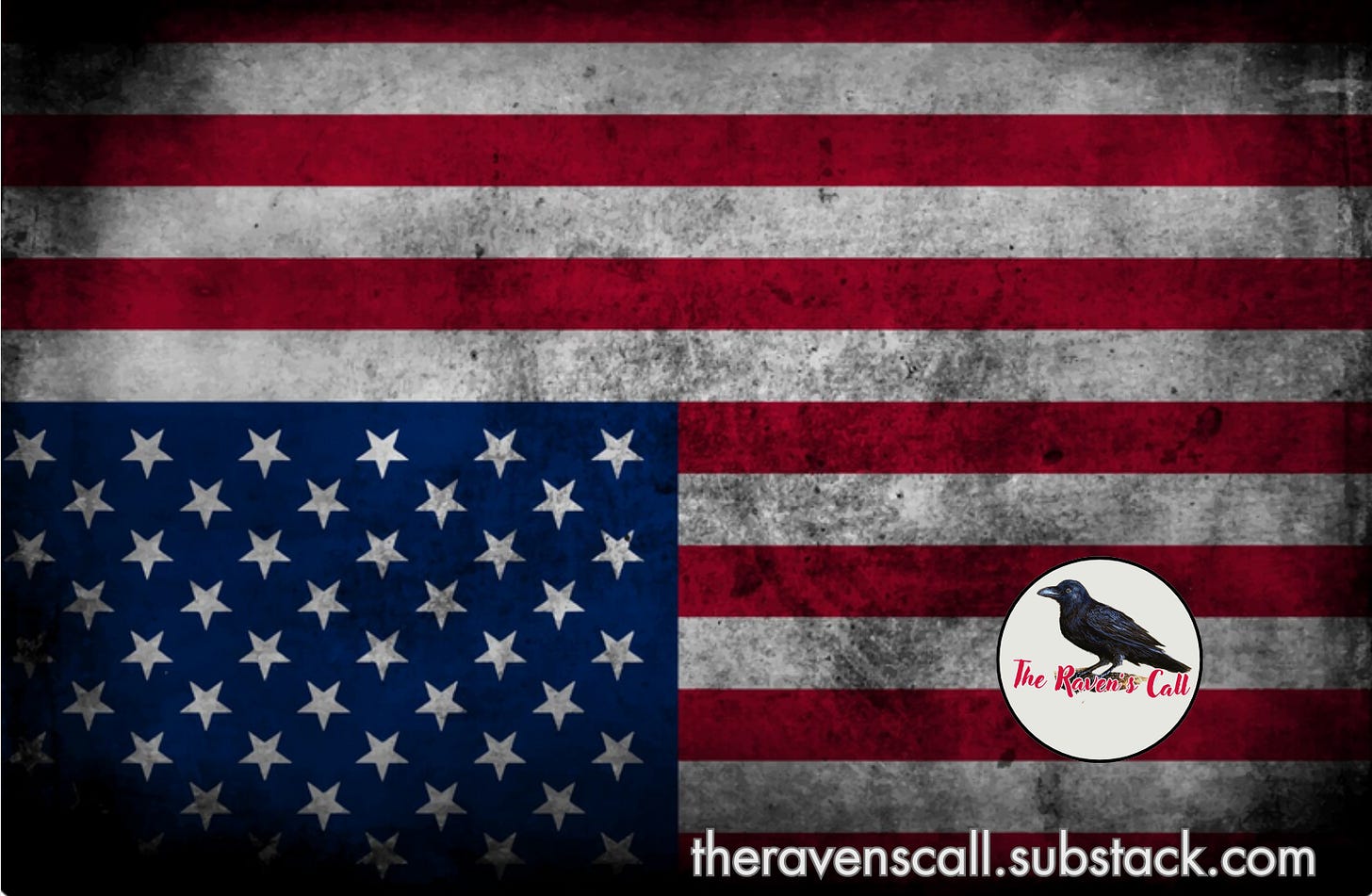
Support for Donald Trump as President properly arises out of a sense of pragmatism and an understanding of how close the Democrats and the left are to consolidating power beyond the point of no return. Those of a more reactionary, populist perspective never regarded him as ideologically perfect. Overt Zionist tendencies, even marrying his daughter, Ivanka, to the wealthy, powerful Jewish Kushner family, his scandalous history with women, and other flaws always rendered support for Trump’s presidency as a grudging compromise, necessary to prevent Hillary Clinton and Kamala Harris from being elected President of The United States. This compromise is even more trying for those who rightly regard American hegemony, waning though it may be, with trepidation and even revulsion. On that matter, Trump’s popularity has drawn heavily from crass American chauvinism. This explains the unusually bright blue suit and red tie he wore throughout his campaign and still wears quite often even now. Such unusual attire is constantly worn precisely because it is so reminiscent of the American flag. It also explains why Lee Greenwood’s horrible song “God Bless the U.S.A.” is constantly played during all of his appearances, from campaign rallies and speeches as well as various speeches and presentations as president. Despite how awful the song is, it remains quite popular, particularly among large contingents of the opposition to the Democrats and the left—and Trump’s core constituency most specifically. The song remains so popular in large part because it has become a sort of anthem to what is more or less a populist, right-of-center movement in America that has enjoyed some measure of political success in electing Trump and moving the GOP away from establishment, corporate conservatism to some small degree. This rather unpleasant consideration requires a critical examination of both the history and lyrical content of this anthem often referred to as “Proud to Be an American,” but is in fact titled “God Bless the U.S.A.”
The song was written and recorded in 1984, and was featured in a documentary on President Reagan in conjunction with his historic landslide electoral campaign that year. Interestingly, both Lee Greenwood and the song are classified in the country music genre, even though the song sounds nothing like country music in a typical sense, as is the case with much of what passes as country music over the past several decades. This song had remained somewhat obscure, until the Iraqi invasion of Kuwait in 1990 and the American military response in Operation Desert Storm in January to February of 1991. General Norman Schwarzkopf is reported to have played the song at his headquarters in Saudi Arabia. Notably, it achieved much greater popularity in the wake of the 9/11 terrorist attacks and indeed was used to galvanize support for military actions not just in Afghanistan but, quite significantly, the invasion of Iraq and the subsequent occupation and effort to install “democracy” in that country. Stated another way, it was used as propaganda to garner support for what are derisively referred to as the “forever wars” which have wasted trillions in treasure and needlessly squandered the blood of American and allied soldiers. These forever wars also include acts of American aggression against Syria and Lybia, as military conflict with Iran has been on the bubble for decades. Since 2016, the song has been embraced by Donald Trump in all three of his presidential campaigns, but was arguably most prominent in his comeback presidential campaign in 2024.
Notably, the song has been adopted by the Department of Defense (now the Department of War) since 9/11. It is invariably played at veterans’ functions as well as official functions for various entities in the armed forces. The Internet is awash with various accounts of the song’s prominence in military life. Indeed, the song is often played at the conclusion of basic training, the completion of which marks a recruit’s graduation as a full-fledged service member. By selecting this song, the United States military psychologically conditions those who serve in its ranks, linking both the song and its lyrical content with the positive emotional experiences associated with these and other events associated with military service.
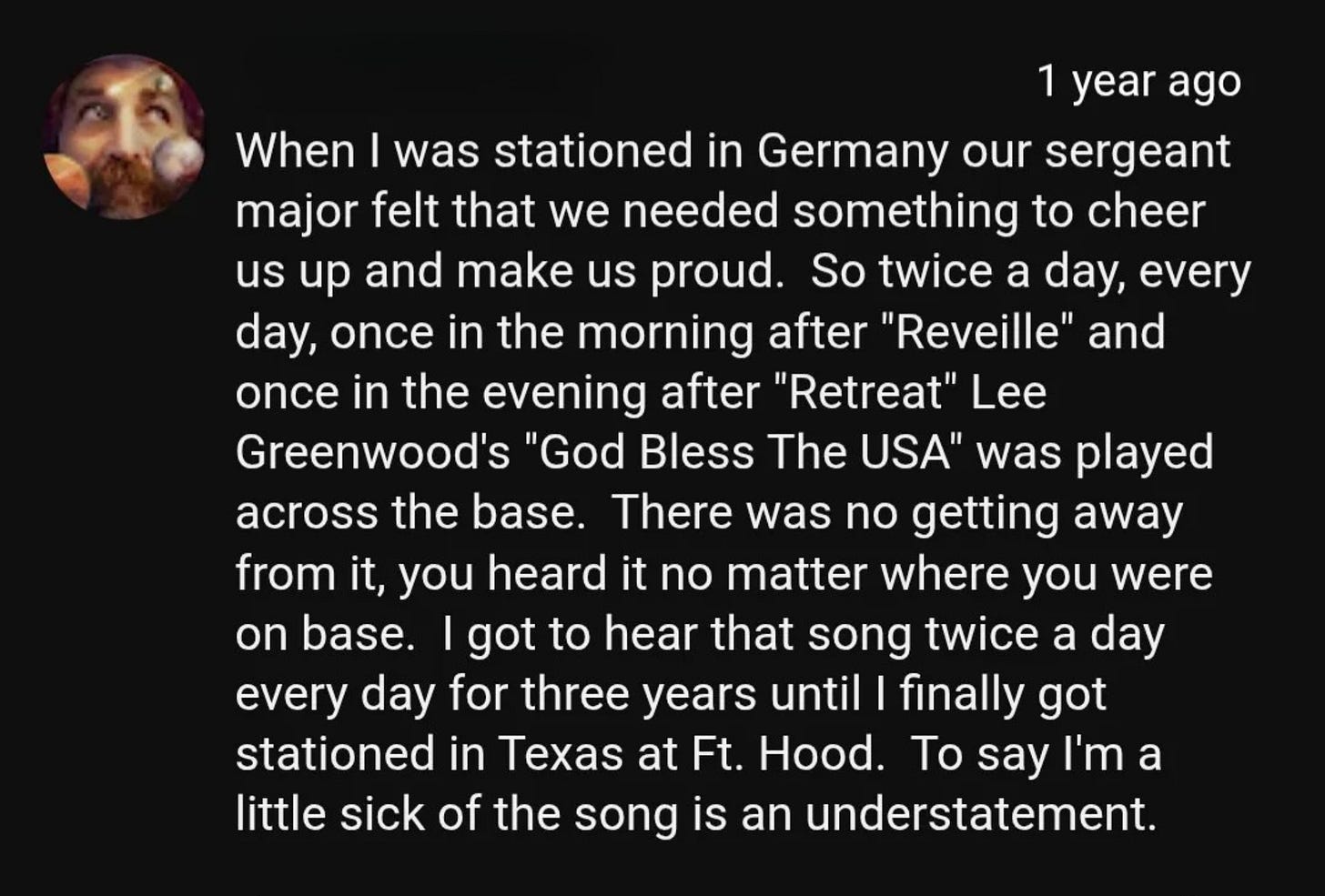
The first two stanzas are perhaps the most remarkable. They read as follows:
If tomorrow all the things were gone
I worked for all my life
And I had to start again
With just my children and my wifeI thank my lucky stars
To be living here today
‘Cause the flag still stands for freedom
And they can’t take that away
Salient words indeed: the opening explicitly envisages losing everything except family. Ironically enough, or perhaps not so ironic given who and what the ruling class in this country is, such grim prospects are not entirely uncommon in a country that has oscillated between economic malaise and economic disaster over the past 25 years. Indeed, this country has now experienced three—THREE!—“once-in-a-lifetime” economic disasters since the turn of the millennium: 9/11, compounded by the Enron and Worldcom securities fraud scandals; the Great Recession of 2008, and the slow-burn economic disaster that has unfolded with insane Covid policy that destroyed between one-fourth and one-third of all small businesses. This prolonged economic disaster that has unfolded for over half a decade has been compounded with unprecedented inflationary spending and the inflation that inevitably results, further exacerbated by hundreds of billions wasted on the proxy war in Ukraine.
It is interesting indeed that the song references having a wife and family, a fortuitous circumstance that disaffected men have increasingly been left without, starting with Generation X and only getting progressively worse with each successive generation. The song presupposes what used to be a norm in American life decades past, but is increasingly less the case. Each successive generation is less likely to have marriage and children, just as more end up in divorce. More Americans, particularly young men, are also subject to so-called single motherhood, the boyfriends who come and go, or a second marriage replete with half and step siblings and a second husband who exemplifies all the various stereotypes about evil step-parents. The song is also peculiar in presupposing that women typically stay with men during such hardship; this is usually not the case.
While the stanza presupposes a baseline norm that is less and less common, both this and following stanzas are also notable for their propensity to inculcate a spirit of total sacrifice for those who find the song endearing or moving. The song explicitly contemplates losing (almost) everything and being unquestionably grateful and loyal to the United States regardless. This is not necessarily something ignoble, provided that the society in question honors the social contract that is supposed to exist between individuals and that society. If a person loses everything through no fault of his country, these values of loyalty and honorable are deeply admirable. However, it has become increasingly apparent that both the American government and American society have not honored this social contract. Indeed, many real-life situations in which persons, including combat veterans, lose everything has not only become somewhat common, but is part and parcel of various sociological and societal problems that can be directly traced to United States foreign and domestic policy. Many of these problems also arise naturally and inevitably from various dysfunctional, subversive, and harmful elements in what passes as American “culture.” Is it then still noble for people to stand by a nation and its society that has harmed so many tens of million through a wide range of disastrous policies, or is this the sort of thing for gullible suckers? Consider that more discerning individuals stop asking “what you can do for your country” and instead “ask what your country did to you.”

It is in this particular context of the prospect of losing almost everything that the song affirms—in the refrain chorus—love for this country because of the “freedom” its citizens supposedly enjoy: “And I’m proud to be an American / Where at least I know I’m free.” The song then admonishes—in non sequitur fashion—that the singer “won’t forget the men who died / Who gave that right to me.”

Both of these assertions, so core to garden-variety American jingoism, require close examination and scrutiny. Consider that “freedom” is a highly overrated value, and that, somewhat paradoxically, a higher sense of freedom is often achieved through less freedom. This paradox is exhibited in many different instances, but it is perhaps best demonstrated by comparing some of the more appalling settings in modern America with more authoritarian polities. Modern-day Singapore is an excellent example that is both demonstrative and less controversial than certain other historical predecessors. In “State Power: A Most Effective Means to Achieve Important Ends,” a street corner in Singapore is juxtaposed with the infamous intersection of Allegheny and Kensington in Philadelphia. That infamous den of drug abuse, crime, and violence is hardly an outlier, as confirmed by a brief survey of many American cities, from Baltimore to St Louis, from Jackson Mississippi to less affluent areas in Los Angeles. Those of a race realist perspective correctly point the finger at racial differences, namely intractable deficiencies in intellect that have stubbornly defied all attempts at remediation as well as a veritable “racial commitment to crime” that together define a critical mass of the black population as well as mestizos to some lesser extent. But this is not the only factor behind the spread of American squalor and disenfranchisement. Whites in particular have been victimized by the proliferation of illicit and destructive drug abuse, most notably the opiod and methamphetamine epidemics. This is compounded, seemingly in exponential fashion, by the downward mobility of a critical mass of Americans, notably white Americans. As was reported this week, the average age of buying a home in this country is now forty, as this hallmark of the American middle class has become only more elusive for each successive generation.

Critically, these and other social ills which are destroying lives and destroying whatever semblance of society exists in this country are properly attributed, to a very large degree, to American notions of “freedom.” In the context of multiple drug abuse epidemics that plague American society, restrictions imposed by the Constitution as well as a passive, grudging acceptance or at least tolerance of these vices beget a permissiveness of drug cartels and the drug trade. Conversely, these evils could be quickly dispatched through authoritarian measures, with a merciless, iron hand and a hardened heart with more than a mere propensity for cruelty and bloodlust in the service of the public good. This is proven by Singapore itself, which sanctions many drug offenses with the death penalty, and invokes the sanction of caning in less serious instances.1 However much some may condemn Mao Zedong as mass murderer in other instances, his unwavering brutality ended the opium epidemic almost instantly and saved China from a national vice that had been consuming the Chinese people for over a century. Mao’s policy was very simple. Any individual apprehended in the trade side was promptly tried and executed, starting with drug runners, many of whom were minors.2 These and other low-level players would implicate their superiors before execution, and on up the chain it went until the drug kingpins themselves were apprehended and liquidated. Authorities dealt with addicts with a carrot-and-stick approach, offering them an opportunity for rehabilitation, but with the clear understanding that truly punitive measures, including imprisonment, forced labor, and even execution await if the “carrot” does not work. An obvious disclaimer seems obligatory: executing young children for drug running simply goes too far. Such excesses notwithstanding, the ruthless initiative of the Chinese communists proves that unwavering brutality with iron resolve and swift carriage can solve problems like the opium crisis or the opiod and methamphetamine epidemics very, very quickly.
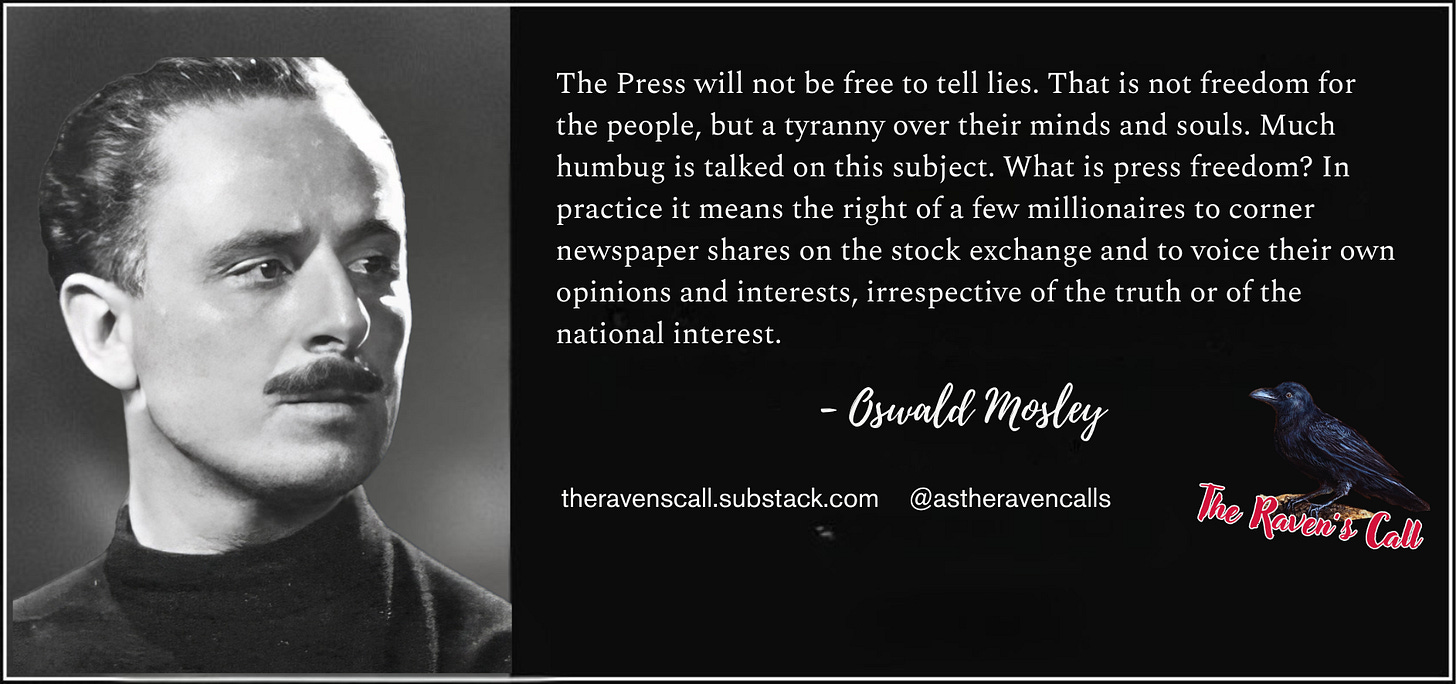
These notions of freedom are harmful in other ways. As Oswald Mosley articulates, freedom of the press is really nothing more than carte blanche license for moneyed interests to acquire and consolidate mass media concerns, to propagate civilization-destroying lies and filth. American permissiveness has also led to the proliferation of myriad other vices that destroy lives, from pornography to the burgeoning sports gambling industry, and so much more besides. As set forth above, that same ethos has also allowed high finance and moneyed interests to wreak incalculable harm on society, from a wide-ranging number of securities fraud scandals to the 2008 economic collapse. That same anarchic ethos has granted entities like BlackRock free rein to horde real estate and other commodities individuals need to have any quality of life.
Conversely, various practical considerations, as demonstrated in cancel culture, effectively deter ordinary citizens from any utterance that defies received orthodoxy on any number of important social issues. Even attempts at maintaining relative anonymity often fail. Those who condone the current regime of onerous civil rights laws, most notably Title VII, incredulously speak of a “workplace free of political contest,” but these laws have in fact promulgated both a set of government agencies and a human resources hive mind that permits certain, favored expressions while sanctioning others with loss of employment and livelihood. As set forth in “Power, Naïveté, and Cynicism: Reconceptualizing the First Amendment,” the Equal Employment Opportunity Commission has effectively sanctioned and deterred a wide range of expressive activity both in the workplace and outside of it. In one example, postal workers were prohibited from wearing garments (namely t-shirts) featuring the Gadsden flag, after a black employee complained it created a hostile working environment. That management eventually prohibited such attire did not prevent the EEOC from allowing a complaint to proceed in court. These and other considerations reveal that such blather about “freedom” is largely a chimera. Even worse, the body of so-called civil rights laws prevent Americans from hiring whom they please, living among whom they please, and have effectively gutted and eviscerated any association of freedom that was once enjoyed.

The oft-repeated assertion about sacrifice of those who served giving Greenwood and his patrons “that right” also requires close scrutiny. At the outset, it must be noted that whatever that right Greenwood and his fans are referring to remains remarkably undefined.3 But these and similar sentiments suggest, at some level, that absent American interventionism and war-mongering over the past 110 years, Americans would enjoy none of the supposed liberties set forth in the Constitution and the Bill of Rights most particularly. As stated in “Democracy as Pretext for American Hegemony,” this country “has never faced any real foreign threat since The War of 1812.” Despite Woodrow Wilson’s abject lies about “making the world safe for democracy,” Imperial Germany had neither designs nor the capacity (most especially maritime capacity) to threaten American hegemony in the Western hemisphere. Detractors will often cite the infamous Zimmermann telegram, but even conceding its authenticity, the telegram contained a conditional statement that was only invoked in the event the United States declared war on Germany. This was in the context of the United States lending aid and support to Great Britain, even though Germany otherwise would have had no quarrel with the United States but for its overt interventionism and provocations.
The same principle applies in relation to The Third Reich in World War II. Whereas the United States did—wrongly—declare war on Imperial Germany in World War I, Hitler of course declared war on the United States in the immediate aftermath of Pearl Harbor.4 This of course was a strategic blunder that essentially doomed Germany, pitting her and her heroic feldgrau columns of the deutsche Wehrmacht against a third peer power—all while bogged down at the outskirts of Moscow in the wake of a historically severe Russian winter and sizeable casualties since unleashing Barbarossa. By declaring war on the United States before pacifying either the United Kingdom or the Soviet Union, Hitler foolishly did precisely what his enemies, namely Churchill, Roosevelt, and Stalin wanted him to do.
Although a key reason to denounce the Führer for “very different reasons” than implored by conventional wisdom, this strategic blunder was nonetheless made in the context of significant provocations by the Roosevelt administration. This includes lend lease to not just the United Kingdom but Stalin’s Soviet Union as well, providing destroyers to the United Kingdom just as the War in the Atlantic was on the precipice of winning the war for Germany, and even attacking German U-Boots without provocation.5
The decision to declare war on the United States is not to be condemned under the abject lie that Germany did not have legitimate grievances, but rather that she simply did not have the material wherewithal to prosecute such a war successfully. As stated in “Denouncing Hitler for Very Different Reasons:”
If Germany and her war machine were a truly omnipotent force, as invincible as imaginary space invaders from Mars or some other fantastical distant planet, Germany would have been absolutely and utterly justified in declaring war on the United States. But even as the Wehrmacht was the very paragon of military discipline and one of the greatest fighting forces in the annals of military history, the Wehrmacht, although a most lethal instrument indeed, was not so omnipotent.
These and other considerations thus belie the cliched assertion that American servicemen died to “give that right”—whatever that means—to those who lap up such sentimental schmalz. If the United States had not stuck its ugly and utterly ruinous, civilization-destroying snout where it did not belong, Americans would in any case still enjoy “freedom”—whatever that is supposed to mean. This consideration is bolstered by the great fortune regrettably bestowed on this nation, as stated in this apocryphal quote falsely attributed to Otto von Bismarck:
The Americans are a very lucky people. They’re bordered to the north and south by weak neighbors, and to the east and west by fish.
In fairness to Greenwood, it must be conceded this song was written and recorded in 1984, during the height of The Cold War. This consideration tempers to some degree the assertion stated above that the United States has not faced a credible threat since 1812. Every year the Soviet government affirmed a mission statement to make communism the one and only form of government throughout the world. Even then, it is dubious whether the Soviet Union ever had the material capacity to invade the United States. Some have posited a polar route invasion strategy, in which the Red Army invades up through the Arctic circle down through Canada before pressing on to American soil outright. It is highly dubious whether this could ever have been executed successfully. Beyond that, the specter of assured mutual destruction vis-à-vis the United States’ nuclear arsenal deterred any such thing even if the Soviets did possess the material capacity to execute such a massive undertaking.
As stipulated in “Democracy As Pretext for American Hegemony,” the Red Army did have designs to push through Western Europe, with a vision of Red Army soldiers washing their boots in the English Channel. This of course was also envisioned in World War II, and was only prevented by the harrowing sacrifice and superhuman feats of the vaunted deutsche Wehrmacht in the face of truly impossible odds. Simply stated, the threat of Bolshevism and the Soviet Union’s status as the other superpower was indeed a threat to world peace and a threat to American national security to some notable degree. But this precarious circumstance is properly attributed to America’s own doing: namely by propping Stalin up against Hitler. And in any case having two oceans to the east and west as well as a nuclear arsenal rendered a scenario of invasion as envisioned in Red Dawn highly improbable if not impossible.
As stated earlier, “God Bless the U.S.A.” was instrumental in rallying support for American military action in the wake of 9/11. While limited action in Afghanistan was justified6, and really should have been done after the attack on the USS Cole the year before, these forever wars have been a disaster of incalculable proportions for American society as well as Europe and the world. No one can say with any degree of precision how much of a role this song played in deluding traditional America to support these catastrophic mistakes. Would neo-conservative elements have been able to persuade large segments of the American population to support these destructive wars if the song either did not exist or was not allowed to be used for these propaganda purposes? They probably would have still been able to throw this country in almost 20 years of protracted, indefinite conflict squandering trillions and squandering so many lives while ruining countless others even without this song. This song was nonetheless instrumental in these propaganda efforts. The song did play a substantial if not pivotal role in deluding otherwise idealistic, mostly well-intentioned men to enlist in wars this country had no justification in waging, as it similarly induced friends and family to support both these wars and a decision to fight in them. How many of those men lost their lives, or suffered horrible injuries, or had to witness comrades die or suffer such injuries on account of the jingoistic schmalz this song ginned up in the masses?
In relation to such hard, difficult questions, it is noteworthy that this song has been used to exploit those who favor it in other ways as well. Indeed, Greenwood partnered with President Trump to peddle a line of bibles that are incredulously marketed to this song. For $64.99 (up five dollars since first introduced), those so inclined can buy an official “God Bless the USA” bible, which features an inscription in hand-written style of the lyrics, as well as The Declaration of Independence, the Bill of Rights, the Constitution, and the Pledge of Allegiance as inserts, with brightly colored graphics associated with the United States flag and other American iconography. Whatever one thinks of either Christianity or such crass American chauvinism, these bibles are more than just more notable exemplars of American vulgarity and a crude money grab. Joining the scripture to American jingoism is theologically unsound, to put it mildly. There was indeed a backlash. The publisher even had to forego use of the “New International Version,” as was originally intended, and print these bibles in the “trusted King James version,” not out of any preference for that version, but because the copyright owners of the New International Version balked. It is of note that several of the videos found on Lee Greenwood’s YouTube channel peddling these and other, more expensive editions of the “God Bless the U.S.A.” line of bibles have the comments sections turned off.
The song is objectionable for other reasons as well. What reason would any person have in being proud to be an American in the first place? Consider the song’s reference to the U.S. Cities Detroit, Houston, New York, and Los Angeles, and further consider what these and other cities represent in actuality.
The subject of Detroit should require no introduction. Many decades ago, Detroit was a beautiful city, renowned throughout the world as a showcase of modern, art deco architecture that had come to prominence during the turn of the 20th Century. In the wake of the post-war order, Motor City has been utterly devastated. A large causal factor was the great migration of blacks from the South. Many of a race realist perspective cite this as the primary and even lone causal factor, but outsourcing of manufacturing by corporations, most particularly American automobile manufacturers, gutted the economic engines in not just Detroit but places like Flint just a few hours north, as well as other cities like Gary, Indiana, which has gained infamy rivaling that of Detroit for its urban decay and ruin. This consideration reveals that the causation for such urban decay and devastation consists of multiple factors, including not just the mad delusion of multiracialism but pernicious economic policy embraced by corporations that gutted the manufacturing base of the American economy. Detroit has made some negligible progress since 2008, but the city is still a blight. Many architectural marvels still lie in ruin with others lying in various states of disrepair. Other grand structures have been razed altogether, with nothing built in their place. Detroit is arguably the world’s premier avatar for urban decay, with several photography books documenting the fallen state of what once was called “The Paris of the Midwest.”

New York City is often touted as the greatest city in the world. Those who have lived and live there still may have reason to disagree. This is true now and it was certainly true when the song was released in 1984, when The Big Apple had been through two decades of infamous urban decay and an unremitting crime spree. Escape from New York was released in theatres just three years before, just as the infamous Bernard Goetz subway shooting happened the same year as this song’s release.
New York City is of course the seat of the financial industry, which, as described above, is largely responsible for the oscillation between economic malaise and economic catastrophe that has plagued American life for a quarter of a century. Many large banks were more than just complicit in the Enron and Worldcom securities fraud scandals. Those outrages were of course eclipsed by the criminal malfeasance underlying the so-called Great Recession of 2008, properly described as a depression. In this way, the economic fallout from the 2008 financial crisis was just another series of outrages and crimes that high finance has not answered for; a true reckoning would look something like the proper response to drug cartels mentioned above. New York is of course the seat of other insidious but powerful interests, notably BlackRock but also many others. Given these and other considerations condemning the famous city, consider as an alternative this line from “She Said Destroy” by Death in June: “She said destroy in black New York.”
New York is to Sodom as Los Angeles is to Gomorrah. Hollywood and above all the pornography industry are, as everyone knows, seated there. This is juxtaposed with neighborhoods of the black and mestizo undertow. Rodney King, gang wars, the Los Angeles Riots of 1992 are as equally associated with Los Angeles as Disneyland, Rodeo Drive, and the cliché of the small-town cheerleader or beauty queen contestant trekking there to seek dreams of fame and fortune only to be chewed up and spit out by the lechers of the Harvey Weinstein sort. Others allow themselves to be procured by the pornography industry that has existed there for decades, with many dying of drug overdose, suicide, and the like, while others lead lives of ruin and regret. Then there is of course the Orenthal Simpson trial, which should have convinced a critical mass of white Americans that the multiracial experiment can never work.
Houston may be the most benign of the four, but what does Houston really offer other than suburban sprawl characterized by endless strip malls and tract housing? It is both unfortunate and an indictment of mainstream American conservatism that the issues of suburban sprawl and urban planning are issues typically championed by the left. Two prominent YouTube channels, “Not Just Bikes” and “City Nerd” have produced sensible and informative content on these issues, but they are both staunchly leftist in the very worst ways on all other matters. Fortunately, the faculties of reason, discernment. and discrimination allow critical viewers to adopt and embrace those contentions and observations that have merit, while discarding the rest. The car-centric planning characteristic of Houston is indeed a blight that has rendered much of America a hellscape. Endless plots of asphalt for sprawling parking lots and ever-growing highways, coupled with the ubiquity of the same iteration of chain stores often contribute to a disorienting effect in any given setting in the United States where a bystander would not have a reason to know where he is at all if were to suddenly find himself at any given place after being blind-folded. Houston, as an avatar of this American blight, is hardly a reason to be proud to be an American. Precisely the opposite.
These and other considerations beg the question why anyone would ever be proud to be an American. For well over a century, the United States and what it passes off as “culture” has been an absolute bane to European civilization and posterity. As has been stated so many times before, what is palmed off as “culture” is in fact a malignant tumor of Unkultur, characterized by all the worst auspices of modernity. McDonalds and Coca-Cola, Kentucky Fried Chicken, Burger King, and Taco Bell are the culinary banners of American cultural imperialism at its worst. This is of course compounded by the proliferation of subversive and harmful music much worse than even the kitschy schmalz of Lee Greenwood. Madonna, Katy Perry, Rihanna, Snoop Dogg (real name Calvin Coldoazor Broadus). Cardi B and now Sabrina Carpenter are unavoidable icons of American “culture” and society.
Those born in America who have sought to emigrate to Europe or have done so successfully know what an embarrassment this country can be in other ways. The sheer force of will necessary to overcome the handicap of being a product of the American education system just to obtain proficiency let alone mastery in a foreign language is an indictment by itself. Anyone who is a product of this nation’s farcical education system and who has sought to overcome such liabilities knows that same force of will is required to obtain even a semblance, a mere glimmer, of a classical education. An expatriate with more enlightened sensibilities can always spot a group of loud, obnoxious American tourists from some distance. The manner of dress of typical Americans is another indictment against Americans collectively, replete with some stupid baseball cap, sneakers, and a t-shirt signifying support for this or that sportsball team. Despite all the insistence to the contrary, it really sucks to be an American. Indeed, the only source of pride as an American derives from concerted efforts to overcome the myriad liabilities and handicaps that arise from being born here in the first place.
Such considerations are compounded by how awful the song is by any measure of good taste. The ham-fisted way the song evokes sentimentality about pride in “being an American” is nothing less than abject schmaltz. The song is also remarkable in how poorly written it really is. A cursory review of the words reveals the song to be yet another instance of the American national character as an emblem of celebrated, even deliberate ignorance. Consider just a couple of grammatical faux pas. The first two lines of the song’s famous refrain read, as stated before, as follows: “And I’m proud to be an American / Where at least I know I’m free.” Being an American is not a place, so the subordinate conjunction “where” is wrong. For this sentence to be correct, it would have to read something like “And I am proud to be in America, where. . .,” but just because someone is in America does not make him an American. “Proud to be born in America” would be in agreement with the subordinate conjunction “where,” but may not sound as good to the ear. The best solution would be to change the subordinate conjunction of the second line to something like “because at least I know I’m free.” The phrase “Cause there ain’t no doubt I love this land” also exemplifies the sort of bad grammar that is often featured in American Unkultur not just as an affectation, but one the plebian masses lap up with particular zeal, like so many pigs at the trough before the slaughter. The folksy schtick of such lines could not be more hokey, and indeed often sound like parody mocking those it caters to.
The song may be less repugnant to the ear than far greater offenses to one’s auditory senses than say Katy Perry’s “California Girls,”7 but not by much. The instrumental fill with electric guitar that joins the verse “I love this land” and “God Bless the USA” consists of three chords, and is strangely reminiscent of the comically basic piano fill from the improvised rendition aptly described as “No More Catholics!” from the Trainspotting sequel.
Sick Boy cautions Renton that he cannot play piano beyond just two chords, but that was enough to rile up the loyalist crowd (whom Renton and Sick Boy had systematically robbed just before being compelled to go on stage). It is also surprising that the canned-sounding drum roll at the song’s climax inspires anyone, let alone tens of millions. Compare such uninspired percussion with this war-time rendition of Preußens Gloria, even as it was recorded with very limited fidelity.
These and other attributes of “God Bless the U.S.A.” are further testament to how culturally and even morally bankrupt American society really is. This is brought in even sharper relief with a firm, unwavering look at a figure such as Lee Greenwood and his peddling of cheap tchotchkes, t-shirts, and hats on his website, to say nothing of his printed-in-China bibles sold for between $64.99 to $99.99. As all meaning is derived from difference, this becomes even more apparent when one considers how this song has become a de facto anthem of the United States military. To think the world’s lone superpower, listing like a slowly sinking ship as it may be, embraces this song or silly, even stupid songs like “Yankee Doodle Dandee” should be a source of national embarrassment. But it is of course seen as such by precious few. Compare and contrast with the truly great marching songs of the seemingly vanquished German military tradition, including Der Königgrätzer Marsch, Preußens Gloria, or even “Alte Kameraden.” “Erika” has been rendered infamous, but the song about a girl named Erika truly instills an ideal for living and, if necessary, fighting and dying for. And who could forget “Westerwaldlied?”
Alas, those with the greatest fighting prowess, better, truly elegant uniforms, and superior traditions in martial music let alone a righteous, but tragically forlorn crusade against International Jewry, Soviet Bolshevism, and the evils of democracy and the modern world do not always prevail.
Unfortunately, as destructive and distasteful as this noxious tune is, it strikes at the heart of many tens of millions of Americans who, despite being deceived and misled into such mad delirium, are more or less well intentioned and without whom there would be no meaningful opposition to the Democrat party and Cultural Marxism at all. This characterization as “more or less well intentioned” of course requires many caveats and qualifications, so much so that some may contest the veracity of the assertion outright. Zionism and more particularly so-called Christian Zionism is far too prevalent in much of the mainstream conservative constituency. Far too much of the conservative base is all too ready to lick Martin Luther King’s taint even still, replete with unironic, genuine assertions such as “The Democrats are the real racists” or even that fascism, national socialism, and other right-wing authoritarian movements both in history and modernity are somehow “left-wing.” This remains true despite “black fatigue” seemingly reaching critical mass with incidents like the murder of Austin Metcalf by a black youth that the black community rewarded with a million dollars in donations, outrage over prolonged, even generational dependence on S.N.A.P benefits, generational Section 8 housing, and other “gib-me-dats,” and other grievances against the black undertow collectively. These and many other caveats notwithstanding, many—although by no means all—of those who favor this auditory affliction nonetheless have good instincts in relation to certain matters such as border policy and third-world immigration, as they also generally have a good sense that both this country and the Western world are on a very bad trajectory.

It is in view of such good intentions and generally good instincts that the song and its propensity to propagate American jingoism should be condemned. As explicated above, this song played some role in deluding mostly well-meaning Americans into the forever wars, just as at least some are duped into buying kitschy “God Bless the USA Bibles”—made in China for a couple bucks, but sold at a handsome profit for $59.99, now $64.99. As an aside, it should be noted this is just the baseline edition, with limited edition versions going for $99.99, and premium edition signed copies by Donald Trump himself commanding a cool one thousand. The web store on godblesstheusabible.com also offers an assortment of apparel in the way of t-shirts, sweatshirts, and baseball caps, as well as various trinkets that range from keychains, a patriotic ping pong ball set, and even a crude mini-sculpture depicting the moment Trump rose after the assassination attempt in Butler, Pa, exclaiming “fight, fight, fight.”
This sort of crass exploitation, what might be more charitably described as monetization, should not be terribly surprising. It fits right in with a number of other distasteful offerings Trump has made over the years. A cursory review of Lee Greenwood as a person is also informative and unsettling. The man, supposedly a good Christian man peddling two-dollar bibles made in China for $65-100, has been divorced FOUR times, and is currently married to Kimberly Payne Greenwood, a woman 25 years younger and former Miss Tennessee beauty pageant winner. Because he was able to avoid the draft legally, it would be unfair and perhaps libelous to call him a draft dodger, but in his youth, when there was a real opportunity to “stand by” those who fought and all too often died for our “right” to “freedom,” he failed to do so.8
In this way, this song and its inseparable association with the Trump campaign, the Trump Administration, and its constituency portend the perils of Realpolitik in endorsing such a flawed, imperfect opposition to the Democrat party. As awful as this song is, as much as it has helped delude millions of Americans from seeing how this very government and country have harmed their interests and their very persons in very real ways, both the popularity of this song and the sentiments it conveys seem thoroughly intractable, at least for the foreseeable future. One hopes such adherence does not lead to similar disasters as the forever wars, but missteps and flaws in the Trump Presidency give more than enough reason for caution. In the meantime, those of more discriminating taste will simply have to plug their ears, mute the television or computer or mobile device when the song is played, or simply just grin and bear it.
Other articles and essays by Richard Parker are available at his publication, The Raven’s Call: A Reactionary Perspective, found at theravenscall.substack.com. Please consider subscribing on a free or paid basis, and to like and share as warranted. Readers can also find him on twitter, under the handle @astheravencalls.
- This author referred to this song as such in two essays recently.
- As was made famous in the 1994 incident with Michael Fay, Singapore has the unique punishment of caning in its criminal justice system. Caning may sound quaint, reminiscent of stern nuns at Catholic schools or Dominatrixes who indulge sordid BDSM fetishes. It is in fact a very brutal, violent method of punishment. Caning strokes rip chunks of flesh out of the prisoner’s ass, often disfiguring and scarring the tissue. The punitive sanction is incredibly painful. Despite being denounced as both cruel and even as torture, it is a remarkably effective deterrent and should be endorsed as a punishment for offenses such as graffiti and low-level drug offenses.
- Some accounts indicate the condemed could be as young as seven years old. This obviosly goes too far and is unnecessary, but it nonethless remains the case that Mao’s unfathomable brutality solved China’s Opium Crisis, saved lives in the net balance, and helped lift China out of unimaginable poverty and squalor.
- \In the song’s refrain (printed above), Greenwood denotes his pride as an American because “at least I know I’m free. The stanza then continues “And I won’t forget the men who died / Who gave that right to me.” “That right” clearly relates back to this state of being “free,” which could not be more vague or non-descript.
- As most readers are doubtlessly aware, Germany’s declaration of war, while timed immediately after the surprise attack and coordinated as part of the Axis alliance, does not mention Pearl Harbor. It does however mention lend-lease, attacking German U-Boots without provocation, as further expounded on in the next footnote.
- The USS Greer, after rushing from Iceland to protect a convoy under wolfpack attack, depth charged German submarines and was in turn torpedoed. 11 sailors died and 22 were injured. Sadly, it was not sunk. This prompted Roosevelt’s “shoot on sight” order, divulged on September 1941 in his weekly “fireside chat” radio programs. That order dictated that American naval and air forces would attack German submarines first, even in the absence of any provocation or attack. This order was announced even though there would be no reason for U-boats to attack US destroyers—in self-defense—if the United States was not sending them as escorts to protect British and Commonwealth merchant vessels that were legitimate targets in a de jure warzone. This in turn led to the USS Reuben James incident, in which an American destroyer, the USS Reuben James, was sunk by Erich Topp in command of U-552 while escorting convoy HX-156. The destroyer was not flying the American ensign and was dropping depth charges on other German submarines, key facts often omitted in American propaganda. In relation to the USS Greer, it is also remarkable that there is “no positive evidence, the navy told the president, that [the German U-Boot knew the nationality of the ship at which it was firing.”
- See footnote two.
- Once again, misspelling of girls in the title “California Gurls” will not be countenanced.
- Greenwood received a hardship deferment having been a father at 17.

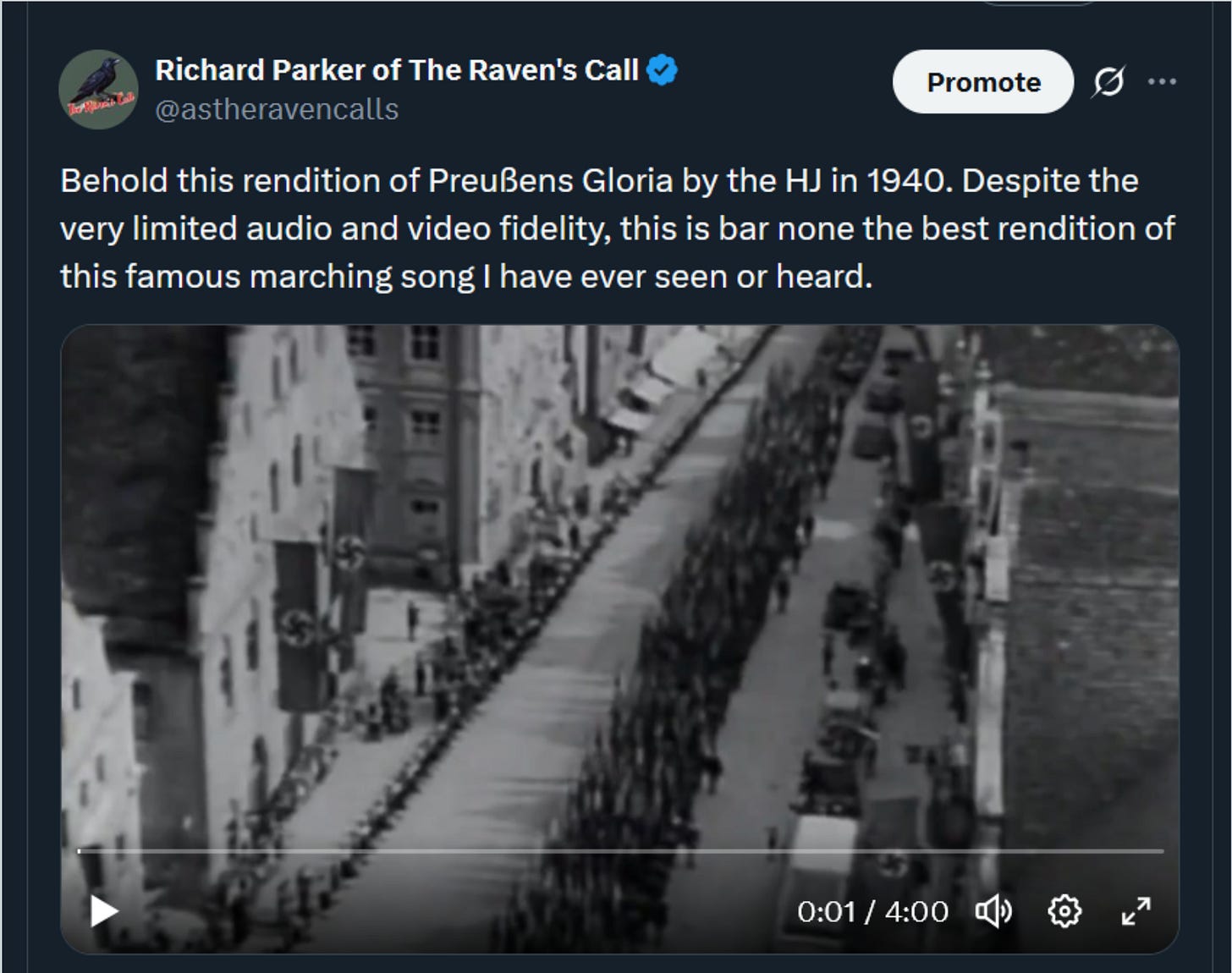
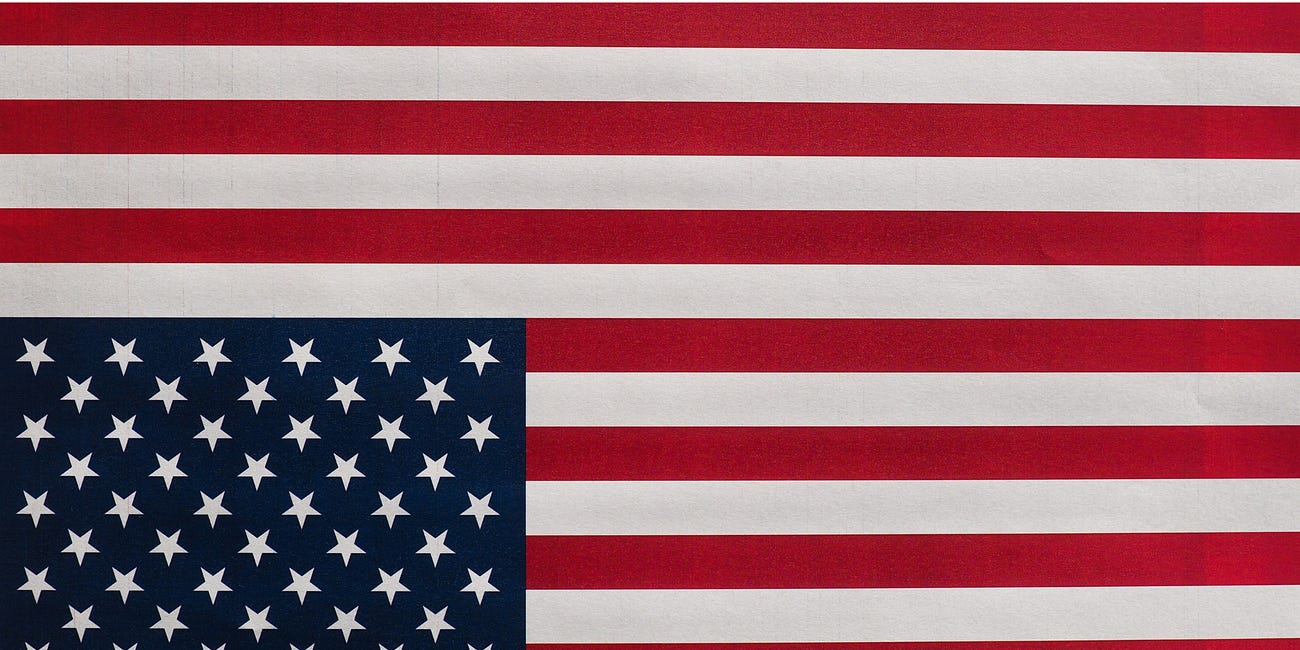




“The song is also peculiar in presupposing that women typically stay with men during such hardship; this is usually not the case.”
If you are looking to father children, you will need a woman; if you are looking for loyalty, better to buy a dog.
Mr. Parker has, overall, produced a very thoughtful, very well constructed article, despite the fact that his taking the terrible Greenwood song as its central metaphor makes it impossible to completely escape the impression that he gets an indecent amount of pleasure out of flogging a dead horse.
My sole strong objection to a point he makes is what seems to me his insupportably dismissive attitude toward suburbs and suburban life, especially in relation to cities, which in the United States are now Jewish-run sinkholes of black degeneracy, crime, and sheer ugliness, human and otherwise.* His links to “Not Just Bikes” and “City Nerds” speak to what is evidently a serious blind spot in his intellectual formation. Put plainly, anyone who thinks that cars are a bigger problem than bicycles and their smug, insufferable riders has a screw loose, whether the locale is a city or a suburb.
On the other hand, there is this:
Not only is this clause undoubtedly true, but it also reminds me happily of the person and the work of one of the finest thinkers and writers ever to have graced this site: Brenton Sanderson. Come back to us, Dr. Sanderson!
_______
*As a lifelong New Yorker, born and bred here and now in his eighty-first year, I know whereof I speak. Not even the city’s once-great, now debased and corrupted, musical and artistic institutions—with one of which I was associated for twenty-six years—any longer serve to make New York City a desirable place to live.
“Not even the city’s once-great, now debased and corrupted, musical and artistic institutions—with one of which I was associated for twenty-six years—any longer serve to make New York City a desirable place to live.”
Cultural institutions in NYC (and nationwide, and throughout much of the West to be honest) have been infiltrated and desecrated with woke/degenerate influence. The Metropolitan Museum of Art used to be a serious art lovers Mecca, uninfluenced by lefty globalist negrophilia or transphilia. That changed after the US top-down cultural revolution of 2020. Now it aggressively features black culture and any black artist it can get its hand on. It also began to feature drag queen story hour for children. Here’s an example from 2021:
https://www.youtube.com/watch?v=ZaYRSUxieBo
Of course, the Museum of Modern Art, being avant-garde, was a year ahead of the 2020 cultural revolution and offered this salon discussion about White males to the public in early 2019:
https://www.youtube.com/watch?v=P2iklRHJgTs
It was around this time that I had to re-evaluate my devotion to cultural institutions. I had to face the fact that much art and so-called education is not free of propaganda by those in power. This waters down the value of good art and also waters down a genuinely open-minded education that values a free mind and a free intellect unharnessed by corrupt power.
H/t.
Re the Left’s “consolidating power” in the next elections is due to both the pending Depression and the degeneration of the GOP and Trumpstein in eating Jewish shit for the last couple of years…as well as decades I guess
The Jews have destroyed the politics of the US by Niggerism and Cannibal Zionism. Dem consolidation of its electoral power will, under severe economic/social hardship conditions, result in the total defeat of the GOP which will be a very good thing for White survival in long term.
With Dem party control over the US, economic and social and racial dynamics will result in , as the Left used to say, sharpening the contradictions of US political life. The short term of about ten years will see blood in the streets and the collapse of anything like what we think we have right now…
There could also be large war disasters just to stir the US melting pot into boiling over, to enrich the darkies’ already poisonous street brews of racial hatreds.
Trumpstein’s wars and Dem party advancing armies of the night, should scare White Folks into a campaign to totally transform the GOP. Maybe.
Otherwise the US and probably Europe as well, are finished.
So Ironic…The traditional LEFT mainly from a Marxist class perspective focused on fighting for WORKERS labor rights, benefits, conditions etc. Long ago the LEFT abandoned the Universal umbrellas of Working Class for the trap of putting sexual ID above labor.. I find it so cinical, ironic that LEFT radical pro open borders, sex rainbow activists ara protesting ICE/DHS deportations.ONLY ..BUT IN FACT PRO OPEN BORDERS PRO MASS IMMIGRATION ARE REALLY MAKING IT MUCH MORE EASIER FOR BUSNISSES CORPORATIONS TO EXPLOIT AND PAY SLAVE WAGES TO ILLEGAL MIGRANT WORKERS…The left becomes an accomplice to working class labor explotation…so ironic..Many bklue dem cities have failed schools, crime waves, uneployment,hunger, homelessness illiteracy, BUT the LEFT never protest agaisnt that…only about protecting CRIMINAL illegal aliens..why??
Your post serves as a reminder of the dangers inherent in so-called thumb-typing. That happens to me all the time. I keep reminding myself to simply do away with “texting” and “thumb-typing” altogether.
As to your question, it should really be no surprise. Thoughts and questions such as yours always reminds me of this quote by Boyd Rice:
That which seems grand and noble is but an affliction. All that appears to grant freedom to mankind has in fact ordained its’ enslavement, impairing and crippling from within while outwardly bearing the banner of liberty. – Spoken word portion from “Since Yesterday” by Current 93.
As an aside, readers who enjoy such music should definitely take a gander at the “Musik” section of my publication. There is a ranking of Death in June albums, and on December 7, a long-form essay on Death in June will be posted. There is also an essay on goth and indie-alternative music sub-culture as an example of what Dr. Kevin MacDonald describes as “implicitly white” when referring to the GOP (at least in the past), NASCAR, and country music.
I agree with the featured comment from the soldier posted within the article. I, too, am sick of Lee Greenwood’s horrible song. And, I wonder if Greenwood ever has any regrets or feels any personal shame or embarrassment over releasing that song and over his allowing it to be used as a war propaganda tool to brainwash both US military people and also the civilian population of America into going along with these diabolically evil, murderous neocons and their endless lust for wars that never end? Wars, as we all now know, since the false flag of 9-11 and since the baldfaced lies of Poppy Bush about babies being thrown out of incubators by Iraqis during the first Iraq War, and about the known to be non-existent WMDs that Jorge WMD Bush used as an excuse for the second Iraq War – every one of these neocon wars have been based on LIES and millions of people died as a result.
Does Lee Greenwood feel ashamed for allowing himself to be used to propagandize his fellow Americans into supporting this criminal carnage?
It sure looks that way to me.
Are we sure his name isn’t Leonard Greenbaum?
The FDR “Fireside chat” of September 1941 also referred to the fake map created by British intelligence that purported to show how Germany intended to carve up South America.